Free E-Mail
Bible Studies
Beginning the Journey (for new Christians). en Español
Old Testament
Abraham
Jacob
Moses
Joshua
Gideon
David, Life of
Elijah
Psalms
Solomon
Songs of Ascent (Ps 120-135)
Isaiah
Advent/Messianic Scriptures
Daniel
Rebuild & Renew: Post-Exilic Books
Gospels
Christmas Incarnation
(Mt, Lk)
Sermon on the Mount
(Mt 5-7)
Mark
Luke's
Gospel
John's Gospel
7 Last Words of Christ
Parables
Jesus and the Kingdom
Resurrection
Apostle Peter
Acts
The Early Church
(Acts 1-12)
Apostle Paul
(Acts 12-28)
Paul's Epistles
Christ Powered Life (Rom 5-8)
1 Corinthians
2 Corinthians
Galatians
Ephesians
Vision for Church
(Eph)
Philippians
Colossians,
Philemon
1
& 2 Thessalonians
1 & 2 Timothy,
Titus
General Epistles
Hebrews
James
1 Peter
2 Peter, Jude
1, 2, and 3 John
Revelation
Revelation
Conquering Lamb of Revelation
Topical
Glorious Kingdom, The
Grace
Great Prayers
Holy Spirit, Disciple's Guide
Humility
Lamb of God
Listening for God's Voice
Lord's Supper
Names of God
Names of Jesus
Christian Art
About Us
Podcasts
Contact Us
Dr. Wilson's Books
Donations
Watercolors
Sitemap
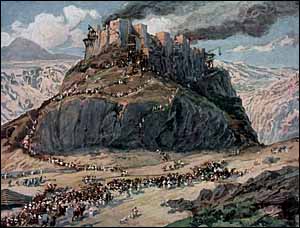 James J. Tissot, 'The Conquest of the Amorites, as in Numbers 21:25' (1896-1902), gouache on board, The Jewish Museum, New York. |
The Book of Joshua begins with exciting exploits, ups and downs, and instructive events in the first nine chapters. But then it seems to bog down with confusing battle stories and long lists of boundaries as areas are assigned to each tribe.
We'll move through these chapters fairly rapidly, but it's important that we see the valuable lessons of these chapters.
Every Place Where You Set Your Foot
"Every place where you set your foot will be yours: Your territory will extend from the desert to Lebanon, and from the Euphrates River to the western sea." (Deuteronomy 11:24)
"I will give you every place where you
set your
foot, as I promised Moses."
(Joshua1:3)
"Set your foot" (NIV) is literally "that the sole of your foot will tread upon" (NRSV, ESV, KJV). Moses' promise to the people of Israel -- provided that they are faithful to the Lord -- is repeated to Joshua at the beginning of the Conquest. Later, Caleb recalls the promise as he prepares to take Hebron:
"On that day Moses swore to me, 'The land on which your feet have walked will be your inheritance and that of your children forever, because you have followed the LORD my God wholeheartedly." (14:9)
It is one thing to fight a few battles, it is another to set your feet upon your own land and occupy it in accordance with God's promise. That's what begins to happen in these chapters.
As we've seen before, the Conquest of the lands east of the Jordan took place before Moses died. Now, the united armies of Israel prepare to conquer the lands west of the Jordan.
However, it's important to distinguish between the battles of conquest and the actual occupation of the lands. Kitchen observes that during this period.
"[Israel] remained based at Gilgal. These campaigns were essentially disabling raids; they were not territorial conquests with instant Hebrew occupation."[33]
Battle at Gibeon with the Five Amorite Kings (10:1-28)
As you'll remember, Lesson 5 ended with the Gibeonite Deception (9:1-15). As a result, Israel's leaders made a suzerain-vassal treaty with Gibeon, which obligated Israel to defend Gibeon if it were attacked.
Gibeon is strategically placed along the trade routes of the central hill-country. When Gibeon's former city-state allies hear that the Gibeonites have now allied themselves with Israel, they are very upset.
"[The king of Jerusalem] and his people were very much alarmed at this, because Gibeon was an important city, like one of the royal cities; it was larger than Ai, and all its men were good fighters. 3 So Adoni-Zedek king of Jerusalem appealed [to his allies], 'Come up and help me attack Gibeon,' he said, 'because it has made peace with Joshua and the Israelites.'" (10:2-4)
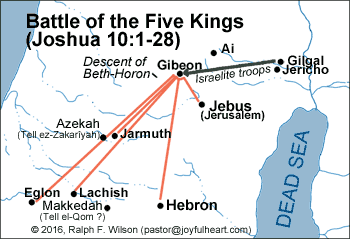 The king of Jerusalem rallies the kings of the most important
cities in the region to form a united army to defeat the Gibeonites and put the
city again under Amorite control. These five kings of the Amorites were:
The king of Jerusalem rallies the kings of the most important
cities in the region to form a united army to defeat the Gibeonites and put the
city again under Amorite control. These five kings of the Amorites were:
- Jerusalem, king Adoni-Zedek (which means "Lord King"),
- Hebron, king Hoham,
- Jarmuth, king Piram,
- Lachish, king Japhia, and
- Eglon, king Debir.
The armies of the five kings lay siege to the walled city of Gibeon.
The Gibeonites, now vassals of Israel protected by treaty, appeal to their Israelite overlords to protect them. Joshua seeks the Lord -- he had learned the hard way at Ai that he must not go out on his own. Here, the Lord assures Joshua to go ahead.
The Israelites conduct a night-march from Gilgal to Gibeon, surprise the Amorite kings, and rout them. The disorganized retreat is aided by a vicious and unusual hailstorm that kills a large number of the enemy as they flee to Azekah[34] and Makkedah.[35] Let's consider three amazing miracles that are involved in Israel's victory over the Five Kings.
1. The night-march from Gilgal to Gibeon. Imagine fast-marching a thousand men in the pitch black over a distance of about 21 miles (35 km). Nor is this a march on level ground. The troops climb from Gilgal in the Jordan valley at an elevation of 840 feet (250 meters) below sea level, to Gibeon, at an elevation about 2400 feet (730 meters) above sea level, a rise of more than 3,000 feet (915 meters). If you've ever hiked in the mountains, you know this is a major feat, especially for a night-march. Then, after this arduous climb, the Israelite troops are ready to fight early the next morning after surprising the opposing armies, who are just waking up. A rout ensues.
2. Large hailstones kill many of the fleeing troops, while they are going down the difficult descent of Beth-horon. Meteorologists define hail as having a minimum diameter of 1/5 of an inch (5 mm). But hail can grow to six inches in diameter (15 cm), and as heavy as 1.1 pounds (0.5 kilometers). Now consider what a hardball in baseball can do hitting one's head. (A hardball is 2.9 inches in diameter [about 74 mm], and weighs only 1/3 pound [145 grams]. I once had to pay for hail damage to a rental car when I was caught in a hailstorm in central Minnesota -- and those were just small pellets. The hail that killed the fleeing enemy troops were large enough to kill. The Bible records,
"More of them died from the hailstones than were killed by the swords of the Israelites." (10:12)
3. The sun stands still for a full day, while the Israelites defeat their enemies (10:12-14). How could this be? The Scripture describes the appearance of the sun standing still, not the scientific mechanics required. When you consider what we now know about the rotation of the earth and its orbit around the sun, it boggles the scientific mind to explain how God did this. But somehow he did; that's why we call it a miracle. Something similar took place in King Hezekiah's time (2 Kings 20-11; 2 Chronicles 32:24; Isaiah 38:7-8). Our author exclaims:
"Surely the Lord was fighting for Israel!" (10:14b).
Notice that the sun standing still isn't really in answer to a prayer to Yahweh. Joshua commands publically in the Lord's presence: "O sun, stand still...." (10:12). The author of Joshua was amazed that on this day, "the LORD listened to a man" (10:14).
But is this a case of God listening to man's command? I think Joshua listens to the Lord first, to know what he should do. We see the same kind of command of the forces of nature and illness in Jesus' ministry. Here's how it worked: Jesus listens to what God is saying and doing (John 5:19, 30), and then speaks the miracle into existence.
This is the secret of power in the Christian life as well. We draw close to Christ daily in our devotional life as a way of sensitizing our spiritual ears to hear his voice. Then we obey and follow through with what he shows us.
We as Christ's followers are told to prepare ourselves to fight. We see military references scattered throughout the Epistles:
"Fight the good fight of the faith." (1 Timothy 6:12; 1:18)
"Weapons of righteousness in the right hand and in the left." (2 Corinthians 6:7)
"The weapons of our warfare." (2 Corinthians 10:4)
"The armor of light." (Romans 13:12)
"The whole armor of God." (Ephesians 6:10-18)
Christ has the power. When we fight in his army, we see him do amazing things!
Q1. (Joshua 10:1-28) In the Battle of the Five Kings,
what fighting did God do? What fighting did the Israelites do? How did God
fulfill his promise to Joshua that "no one will be able to stand up against you
all the days of your life" (Joshua 1:5)? Does God expect us to be prepared to
fight in the battle with our enemy the devil? How?
https://www.joyfulheart.com/forums/topic/1664-q1-fighting-alongside-god/
Southern Campaign (10:29-43)
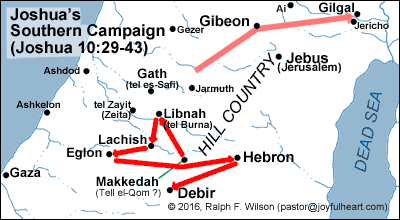 The second series of battles in this section is known as
Joshua's Southern Campaign (10:29-43). The kings and armies of five key cities
were destroyed in the Battle of the Five Kings. In some ways, the Southern
Campaign is a follow-up action to take the cities of several of these defeated
kings.
The second series of battles in this section is known as
Joshua's Southern Campaign (10:29-43). The kings and armies of five key cities
were destroyed in the Battle of the Five Kings. In some ways, the Southern
Campaign is a follow-up action to take the cities of several of these defeated
kings.
|
Battle of the Five Kings |
Southern Campaign |
|
|
Makkedah |
|
|
Libnah[36] |
|
Jerusalem |
|
|
Hebron |
Hebron |
|
Jarmuth |
|
|
Lachish |
Lachish |
|
Eglon |
Eglon[37] |
|
|
Debir |
Note that, though Jerusalem's king is killed (10:26) following the Battle of the Five Kings, Jerusalem itself is not taken at this time. At one point the tribe of Judah attack Jerusalem and set it afire (Judges 1:8). However, even then, they don't succeed in dislodging the Jebusites, who persist there (Joshua 15:63; Judges 1:21) until David conquers the city about 1000 BC (2 Samuel 5:6-8). Even then, David purchases from "Araunah the Jebusite" a place to worship that becomes the temple mount.
Hebron and Debir are defeated in the Southern Campaign. This may be the same incident as when Caleb takes Hebron (also known as Kiriath-Arba; 12:10; 14:13; 15:13-14). We'll look at this in further detail in Lesson 7 as we study the life of Caleb.
Northern Campaign (chapter 11)
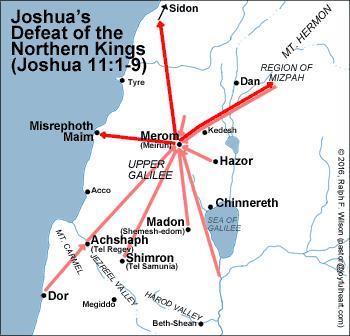 After receiving reports from Israel's resounding victories in
the South, kings in the area around Galilee are worried.
After receiving reports from Israel's resounding victories in
the South, kings in the area around Galilee are worried.
The chief king of the area is Jabin, king of Hazor, who seems to be the suzerain of surrounding vassal kingdoms (11:10). Hazor is a major urban center north of Galilee, mentioned as an important city in Egyptian documents of the period. Jabin sees Israel as a threat to his domination and his power. So he decides to take immediate steps to halt Israel's growing influence. (Jabin seems to be a royal name in Hazor, since this is also the name the king of Hazor who is defeated in the time of Deborah [Judges 4-5]).
Jabin calls on the leaders of his vassal states to bring their troops to join with his. Jabin's chief vassal seems to have been Jobab, king of Madon.[38] Other vassals are the Canaanite royal towns of Shimron[39] and Acshaph.[40] Both are difficult to place exactly. Naphoth Dor, is the farthest from Hazor, a region in the vicinity of Dor, on the Mediterranean coast, south of Mt. Carmel.[41] In addition to these, Hazor calls out unnamed kings in the "northern hill country," as well as along the Jordan River and tribes to the northeast in Mizpah, at the base of Mt. Hermon. The gathering of these forces from all over the area meant that Jabin is determined to destroy Joshua's army by overwhelming force.
The armies are told to gather at the Waters of Merom. Probably it is Meriôn (Meirun) on the slopes of Jebel Jarmaq, about 4 miles (6 km.) west of modern Safed.[42] Joshua hears of the armies gathering against him and brings his concerns before the Lord in prayer. God encourages him:
"Do not be afraid of them, for tomorrow at this time I will give over all of them, slain, to Israel." (11:6)
Joshua believes God. Instead of encamping across from them, Joshua acts quickly.
"Joshua and all his warriors came suddenly against them ... and fell upon them." (11:7)
Surprised by the attack, the enemy armies panic and flee, "and the Lord gave them into the hand of Israel" (11:8). Joshua's troops chase the fleeing soldiers and cut them down. Now defenseless without their armies, Joshua captures nearby Hazor, kills Jabin as well as all in the city, and destroys it by fire, "devoting them to destruction" as an offering to the Lord (11:10-11). The verb is ḥāram, "destroy utterly," which is discussed in greater detail in Lesson 4 and Appendix 6. Then Joshua goes to the other cities whose kings had joined in the attack against him, "devoting them to destruction," though he doesn't burn them as he does Hazor.
This section concludes with a summary statement:
"As the LORD commanded his servant Moses, so Moses commanded Joshua, and Joshua did it; he left nothing undone of all that the LORD commanded Moses." (11:15)
Summary of the Conquest (11:16-12:24)
The remainder of chapter 11 and all of chapter 12 rehearse all the areas that Joshua conquered, and list the thirty-one kings and royal cities that were taken. When you read carefully the lists of cities subdued, however, you find that though the land is largely subdued, Joshua doesn't completely remove the inhabitants from the land in one campaign.
Three words describe steps in the process:
1. Take
"So Joshua took all that land...." (11:16a)
"So Joshua took the whole land...." (11:23)
"Took" is lāqaḥ, a very common root, used over a thousand times in the Old Testament. It has the general meaning "take (get, fetch)" as well as "lay hold of, seize," the sense in which it is used in our passages.[43]
This describes the major campaigns to destroy the main kings and their armies. Once the armies are defeated, the main cities are taken, and the inhabitants killed. On several occasions, the cities are burned -- Jericho, Ai, and Hazor (and Jerusalem, according to Judges 1:8). But the rest of the cities are left standing so that the Israelites can occupy them when the army completes its task of defeating the Canaanite armies.
2. Divide
"Be sure to allocate[44] this land to Israel for an inheritance, as I have instructed you, and divide it as an inheritance among the nine tribes and half of the tribe of Manasseh." (13:6b-7)
Whether or not the land has been completely subjugated, Joshua is to allocate it to the various tribes, who will then complete the subjugation. "Divide" in verse 7 is the Piel stem of ḥālaq, "share, divide, allot, apportion, assign."[45]
Some of the cities that had been conquered, need to be reconquered later -- notably Jerusalem (2 Samuel 4:6-10). And it appears that the pagan cities defeated initially, didn't submit all at once.
"Joshua made war a long time with all those kings." (11:18)
What is neatly summarized in chapters 10 and 11 takes years. And even then, it is incomplete. However, finally, we read:
"So Joshua took the entire land, just as the LORD had directed Moses, and he gave it as an inheritance to Israel according to their tribal divisions. Then the land had rest from war." (11:23)
3. Possess
The third step is to possess the land, that is, to take up residence in the land.
"When Joshua was old and well advanced in years, the LORD said to him, 'You are very old, and there are still very large areas of land to be taken over.'" (13:1)
"Be taken over" (NIV), "possessed" (NRSV, ESV, KJV) is yārash, "take possession of, inherit, dispossess."[46] Hartley explains, "In military matters [yārash] means to gain control over a certain area by conquering and expelling the current inhabitants of that area. In such a light the word came to take on the meaning of 'dispossess, drive out, cast out, seize.'"[47]
It is one thing for Joshua's army to come through a region and destroy any military opposition. But if the cities and land are not immediately inhabited by the Israelites, remnants of the former pagan residents creep back in and take up residence again in their accustomed lands.
When the men in the armies return to their families in Gilgal, they can go with their wives and children to the assigned tribal lands and be protected there by the other men-folk who became farmers. They need to be ready to fight if attacked by pockets of Canaanite resistance.
The map below shows the areas that Israel had subdued and now dominates. Notice, however, that some of the areas -- even though it is territory assigned to one tribe or another -- have pockets of resistance even many years later.
Several passages hint at this:
"They did not dislodge the Canaanites living in Gezer; to this day the Canaanites live among the people of Ephraim but are required to do forced labor." (16:10)
"The Manassites were not able to occupy these towns, for the Canaanites were determined to live in that region. However, when the Israelites grew stronger, they subjected the Canaanites to forced labor but did not drive them out completely." (17:12-13)
"The people of Joseph replied, '... All the Canaanites who live in the plain have iron chariots, both those in Beth Shan and its settlements and those in the Valley of Jezreel.' But Joshua said to the house of Joseph -- to Ephraim and Manasseh -- 'You are numerous and very powerful.... Though the Canaanites have iron chariots and though they are strong, you can drive them out.'" (17:16-18)
"The Danites had difficulty taking possession of their territory, so they went up and attacked Leshem, took it, put it to the sword and occupied it." (19:47)
The first two chapters of the Book of Judges also suggest that displacing of the peoples of the land has been incomplete. Four passages in Judges parallel this section of Joshua:[48]
| Joshua 15:13-19 | Judges 1:10-15, 20 |
| Joshua 15:63 | Judges 1:21 |
| Joshua 17:11-13 | Judges 1:27-28 |
| Joshua 16:10 | Judges 1:29 |
Unfortunately, this failure to drive out all the Canaanites leads to syncretism in the next generation.
Q2. (Joshua 16-19) Why did God tell the Israelites to
drive out the Canaanites completely? What was the short-term result of failing
to do this? (Joshua 17:12-13). What was the long-term result? (Judges 2:1-3).
https://www.joyfulheart.com/forums/topic/1665-q2-incomplete-conquest/
Distribution of the Tribal Lands (chapters 13-19)
Joshua 14:6-15 details the conquest of Hebron by Caleb, which we'll consider separately in Lesson 7. But for the most part, chapters 13-21 are largely taken up with records of the boundaries of the various tribal allocations, which were made by casting lots. Some of the divisions east of the Jordan -- for Reuben (13:15-23), Gad (13:24-28), and the half-tribe of Manasseh (13:29-32) -- are decided while Moses is still alive (Deuteronomy 32). Judah, the largest tribe, has its portion assigned in chapter 15. The large half-tribes of Ephraim and Manasseh (the two sons of Joseph) are assigned next (chapters 16-17).
The rest of the land is allotted for the seven smaller remaining tribes -- Benjamin, Simeon, Zebulun, Issachar, Asher, Naphtali, and Dan. Joshua instructs them to appoint an intertribal surveying crew:
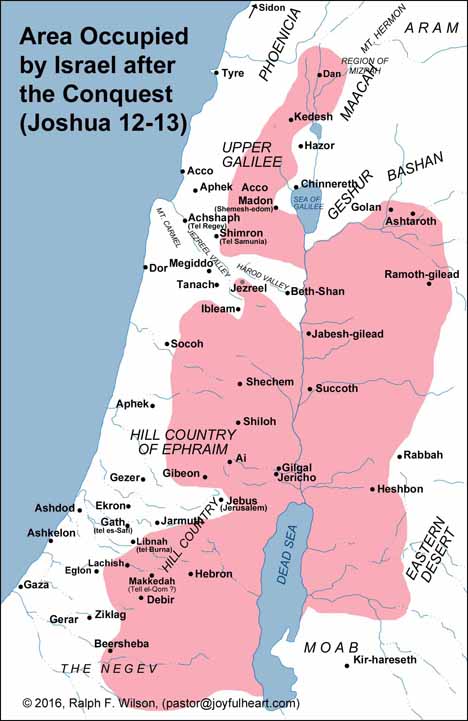
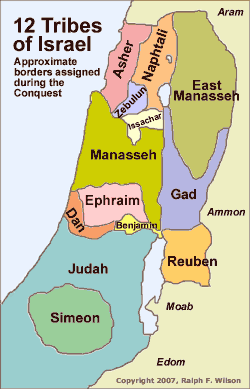
"Appoint three men from each tribe. I will send them out to make a survey of the land and to write a description of it, according to the inheritance of each. Then they will return to me. You are to divide the land into seven parts.... After you have written descriptions of the seven parts of the land, bring them here to me and I will cast lots for you in the presence of the LORD our God." (18:4-6)
As leader, Joshua is given an entire town for his family's possession in the hill country of Ephraim (19:49-50).
Cities of Refuge (chapter 20)
To keep the people from blood vengeance where someone has been killed accidently, Joshua sets up six "cities of refuge." A murder has the right to present his case before the elders of one of these cities. They give him refuge in their city until he can stand trial. He may go home in safety if he is found innocent, or if the reigning high priest has since died.
Towns for the Levites (chapter 21)
The Tribe of Levi is not assigned a tribal territory. Rather, each of the eleven tribes gives them specified towns and pasturelands out of their own inheritance, so the Levites are scattered in towns throughout Israel.
The Trans-Jordan Tribes Return Home (chapter 22)
As you may recall, the Reubenites, Gadites, and part of the half-tribe of Manasseh had been assigned lands east of the Jordan under Moses -- with the provision that they would send their men to fight in the army of Israel when it came time to cross Jordan. Their men have faithfully fought alongside the other tribes, and now Joshua summons them, releases them from their vow, and sends them back to their lands with his blessing.
Lessons from the Conquest
Before we leave these chapters, it's good to consider some of the lessons we see here than can be applied to our own lives. Taking the conquest of Canaan as a metaphor for finding victory in our spiritual lives yields a number of insights.
Your life is like the land of Canaan -- a "land of milk and honey" promised by God our Savior, but needing to be conquered and then possessed by the Holy Spirit for it to become fruitful and reach its potential.
Christ does the heavy lifting of breaking the back of the enemy of our souls who has held us in bondage. Satan is a usurper on what is God's territory. Christ is like the armies of Joshua that move into the center of the land and step-by-step destroy the power of the kings of the land.
The next step is to assign the land to God's people. In our case, he has made us as unique people, each of whom has a tremendous potential of living out lives of blessing before God.
However, the third step of actually possessing the land that has been won and assigned to us seems to us as the most difficult. We find our lives occupied by habits and thought-patterns that won't easily submit to Christ as Lord. They are like rebellious giants who must not only be defeated militarily, but moved out of residence in our lives. They are squatters on land they no longer have any right to, but they are persistent.
"The Manassites were not able to occupy these towns, for the Canaanites were determined to live in that region." (17:12)
The danger is that we will learn to coexist with the sinful habits and patterns of our lives, rather than be more determined than they are, and let God root them out and displace them. The easier path is to "live and let live," but the result is a lack of spiritual victory and constant war with the old self that we allow to still live within us in stubborn pockets of resistance.
Q3. In what way does failing to drive out the Canaanites
correspond to compromising with sin in our lives? What is the consequence of
this compromise? What must we do to end the compromise?
https://www.joyfulheart.com/forums/topic/1666-q3-compromise-with-sin/
Theologically, this process is known by Protestants as "sanctification," the process of allowing Christ to become Lord of every aspect of our lives.
Back in 1951, Presbyterian minister Robert Boyd Munger (who was later one of my seminary professors), wrote a short pamphlet entitled, "My Heart, Christ's Home," still available in print from InterVarsity Press. I encourage you to read it. When I write this, copies are available online.
http://www.usna.edu/Navigators/_files/documents/MHCH.pdf
http://hightechministries.org/assets/documents/My%20Heart%20Christs%20Home.pdf
Munger traces Christ's entry into our lives by us welcoming him in the front door of our 'house.' But then Christ seeks to enter the various rooms -- the library (our mind), the dining room (the room of appetites and desires), the living room (a place of intimate fellowship), the work room, the recreation room, the hall closet, all of which require housecleaning to prepare for his coming. This clean-up requires continued surrender on our part and cleansing by the Holy Spirit so that it is a fit place for Christ to dwell fully.
Some people make it sound like we have to clean up our lives ourselves in order to be worthy of Christ. That's backward. We must surrender our will to his, and sometimes that surrender is sequential rather than all-at-once. But the Holy Spirit himself is the one who does the deep work in our hearts. If you let him, the Spirit can sanctify you and change your life to reflect Christ much more than it does now.
"My Heart, Christ's Home" is a wonderful read. Don't miss it!
Q4. How does Bob Munger's "My Heart, Christ's Home"
explain the process of surrender to Christ. When we surrender to Christ, what
happens to the ugly things in our lives that displease God? What is the effect
on us?
https://www.joyfulheart.com/forums/topic/1667-q4-my-heart-christs-home/
Lessons for Disciples
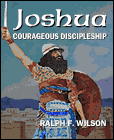
Lessons in book formats are available. |
Reflecting on the Israelites possessing the land leads disciples to some helpful lessons in Christian living.
- When we obey God and trust him to fight for us, we sometimes see him do miraculous acts of deliverance (chapter 10).
- When we fail to obey God completely, we can expect only incomplete victory in our lives and ministries (chapters 16-19; 17:12-13; 2:1-3).
- The incomplete Conquest is a teaching metaphor for our spiritual lives. We must (1) take the land initially through spiritual warfare, and then (2) take possession of it personally to live in it, or the "Canaanites" will creep back into our lives to trouble us. Complete obedience is required for complete victory.
Prayer
Father, if truth be told, there are areas of our lives where we have allowed the enemy to continue to dwell. We haven't driven him out but have learned instead to co-exist. Forgive us. Come afresh by your Spirit into our lives and do what we cannot do. We give you permission right now to do what it takes to set us completely free. In Jesus' name, we pray. Amen.
Key Verses
"On that day Moses swore to me, 'The land on which your feet have walked will be your inheritance and that of your children forever, because you have followed the LORD my God wholeheartedly." (Joshua 14:9, NIV)
"More of them died from the hailstones than were killed by the swords of the Israelites." (Joshua 10:12)
"Surely the Lord was fighting for Israel!" (Joshua 10:14b, NIV)
"Do not be afraid of them, for tomorrow at this time I will give over all of them, slain, to Israel." (Joshua 11:6, NIV)
"As the LORD commanded his servant Moses, so Moses commanded Joshua, and Joshua did it; he left nothing undone of all that the LORD commanded Moses." (Joshua 11:15, NIV)
"When Joshua was old and well advanced in years, the LORD said to him, 'You are very old, and there are still very large areas of land to be taken over.'" (Joshua 13:1, NIV)
"The Manassites were not able to occupy these towns, for the Canaanites were determined to live in that region. However, when the Israelites grew stronger, they subjected the Canaanites to forced labor but did not drive them out completely." (Joshua 17:12-13, NIV)
Endnotes
[33] Kitchen, On the Reliability of the Old Testament, p. 162.
[34] Azekah, the present-day Tell ez-Zakarîyah, is about 15 miles (24 km) northwest of Hebron (F.E. Young, "Azekah," ISBE 1:375).
[35] A number of locations have been proposed for Makkedah, though Dorsey seems to have located it at Tell el-Qom, 7 miles southeast of Lachish and 9 miles west of Hebron (David A. Dorsey, "The Location of Biblical Makkedah," in Tel Aviv: Journal of the Institute of Archaeology of Tel Aviv University, Volume 7, Issue 3-4, 1980, pp. 185-193; William S. LaSor, "Makkedah," ISBE 3:226).
[36] The location of Libnah is uncertain. Most recently Tel Burna has been proposed as the location, about 20 km SW of Jerusalem by Dr. Itzhaq Shai, director of The Tel Burna Excavation Project (https://telburna.wordpress.com/). Other see the location as nearby Tel Zayit (Zeita).
[37] Eglon is thought to be Tell el-Hesi, about 7 miles west of Lachish.
[38] Madon is probably to be identified with modern Qarn Ḥaṭṭîn, located about 5 miles (8 km) west of the Sea of Galilee (Woudstra, Joshua, p. 188). Madon may be identical with Maron (12:19), where the confusion of Hebrew Resh for Dalet probably occurred ("Madon," ISBE 3:212)
[39] Shimron-meron in the next chapter (12:20). It is of uncertain location. Some see this as Marun, on the road from Tyre to Dan (Woudstra, Joshua, p. 188). Others identify Shmron with tel Samunia, on the border between Lower Galilee and the Jezreel Valley. Tel Samunia is about 7 miles (11 km) west of Nazareth (B.R. and P.C. Patten, "Shimron," ISBE 4:480).
[40] Woudstra sees a probable location at Tell Berweh at the foot of the mountains and commanding a road coming down from near Safed. It has also been identified with Khirbet el-Harbaj (Tel Regev) on the Kishon River, east of Mt. Carmel (Student Map Manual, map 5-6.) and Tell Keisan (or Kison), located 9 miles northeast of modern Haifa (Woudstra, Joshua, p. 188, fn. 10).
[41] R.K. Harrison, "Dor," ISBE 1:984.
[42] This is suggested by Noth, and adopted by many other scholars (Woudstra, Joshua, p. 190; Macmillan Bible Atlas, and perhaps William S. LaSor, "Merom, Waters of," ISBE 3:326). Since chariots are involved, it probably isn't the marshy Lake Huleh basin, as some have suggested, since chariots only work well on firm (preferably flat) terrain.
[43] Walter C. Kaiser, lāqaḥ, TWOT #1124.
[44] "Allocate" (NIV), "allot" (NRSV, ESV), "divide" (KJV) in verse 6b is the Hiphil stem of nāpal, to cause to "fall," referring to the falling of the lot used to divide the land, determining God's will by casting lots (Milton C. Fisher, nāpal, TWOT #1392. Woudstra, Joshua, p. 13, fn. 15).
[45] Donald J. Wiseman, ḥālaq, TWOT #669.
[46] BDB 439.
[47] John E. Hartley, yārash, TWOT #920.
[48] The main difference between the accounts in Joshua and those in Judges, is that Judges emphasizes the military work done by the tribe of Judah, while Joshua considers all the tribes' contribution to the conquest.
Copyright © 2025, Ralph F. Wilson. <pastor![]() joyfulheart.com> All rights reserved. A single copy of this article is free. Do not put this on a website. See legal, copyright, and reprint information.
joyfulheart.com> All rights reserved. A single copy of this article is free. Do not put this on a website. See legal, copyright, and reprint information.
 |

|
In-depth Bible study books
You can purchase one of Dr. Wilson's complete Bible studies in PDF, Kindle, or paperback format -- currently 48 books in the JesusWalk Bible Study Series.
Old Testament
- Abraham, Faith of
- Jacob, Life of
- Moses the Reluctant Leader
- Joshua
- Gideon
- David, Life of
- Elijah
- Psalms
- Solomon
- Songs of Ascent (Psalms 120-134)
- Isaiah
- 28 Advent Scriptures (Messianic)
- Daniel
- Rebuild & Renew: Post-Exilic Books
Gospels
- Christmas Incarnation (Mt, Lk)
- Sermon on the Mount (Mt 5-7)
- Luke's Gospel
- John's Gospel
- Seven Last Words of Christ
- Parables
- Jesus and the Kingdom of God
- Resurrection and Easter Faith
- Apostle Peter
Acts
Pauline Epistles
- Romans 5-8 (Christ-Powered Life)
- 1 Corinthians
- 2 Corinthians
- Galatians
- Ephesians
- Philippians
- Colossians, Philemon
- 1 & 2 Thessalonians
- 1 &2 Timothy, Titus
General Epistles
Revelation
Topical

 To be notified about future articles, stories, and Bible studies, why don't you subscribe to our free newsletter, The Joyful Heart, by placing your e-mail address in the box below. We respect your
To be notified about future articles, stories, and Bible studies, why don't you subscribe to our free newsletter, The Joyful Heart, by placing your e-mail address in the box below. We respect your